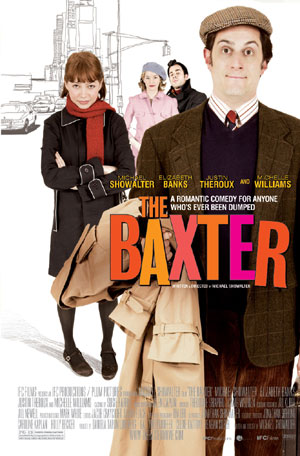 The Baxter is a really sweet little movie. It has a premise so great you have to wonder why it hasn’t been done before: In every romantic comedy, one of the two leads will be about to commit to/marry someone when the other lead will burst in and win the day. So what happens to the poor schmuck who is left at the altar? That sad bastard, according to Michael Showalter, is known as The Baxter.
The Baxter is a really sweet little movie. It has a premise so great you have to wonder why it hasn’t been done before: In every romantic comedy, one of the two leads will be about to commit to/marry someone when the other lead will burst in and win the day. So what happens to the poor schmuck who is left at the altar? That sad bastard, according to Michael Showalter, is known as The Baxter.
Showalter is a member of the famed comedy troupe The State, and the star of the amazing cult classic film Wet Hot American Summer. He’s currently appearing in Comedy Central’s Stella along with State-mates Michael Ian Black and David Wain, who also appear in The Baxter. The film has a great cast, by the way, which includes Michelle Williams, Paul Rudd and Peter Dinklage among others.
The Baxter is Showalter’s directorial debut, and while my review will be up soon, I will say here that he hits a solid triple with his first at bat (man, baseball analogies do not come natural to me). He also wrote the film, and stars as the titular Baxter, a guy named Elliott. Last week I had a chance to sit down with him here in New York City.
Q: Michelle Williams in this film really reminded me of Shirley McLaine in The Apartment. Was that a specific homage?
Showalter: It was not on purpose, but an excellent comparison. Apparently Jack Lemmon’s last name in that movie is Baxter.
Q: It is. Bud Baxter.
Showalter: Two coincidences. But she does have a Shirley McLaine quality to her, which is sweet and innocent, but also wise.
Q: You’re definitely hearkening back to older films. What are the films that you love that influenced this?
Showalter: There’s a whole slew of comedies that I watched from the Capra movies to The Awful Truth to His Girl Friday to Bringing Up Baby. But also almost all of the good movies from that era – What About Eve and Mildred Pierce, all the noir movies and Hitchcock, all for the way the characters talk. It’s for two things – the way the characters talk and also the way the stories are perfectly melded together. There’s something very satisfying about seeing a movie that is so well made. As a film enthusiast and having read a lot of films about it, and having a fascination with the well-made Hollywood screenplay, that’s what I was going for. I would love to write something that was a nice little package like that.
Q: I love that you set this film in Brooklyn. What made you decide to do that?
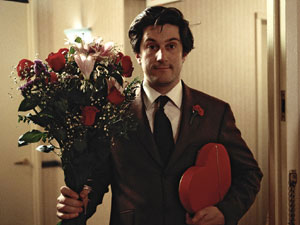 Showalter: I live in Brooklyn and love Brooklyn. I live in Boerum Hill but I also used to live in Carroll Gardens for a couple of years. I’ve been in this one section of Brooklyn, and it’s just such a great city. You could stay in Brooklyn for months and never leave, never need to go to Manhattan. I lived in Manhattan for a really long time, and I loved New York City but someone said to me once that it’s so nice to cross the bridge at night and leave the city behind. I sort of followed that idea. As we all are seeing, Brooklyn is emerging again as this amazing alternative to Manhattan with its own culture, its own architecture and its own history. This movie is kind of a celebration of that, and it’s a perfect setting for a romantic comedy.
Showalter: I live in Brooklyn and love Brooklyn. I live in Boerum Hill but I also used to live in Carroll Gardens for a couple of years. I’ve been in this one section of Brooklyn, and it’s just such a great city. You could stay in Brooklyn for months and never leave, never need to go to Manhattan. I lived in Manhattan for a really long time, and I loved New York City but someone said to me once that it’s so nice to cross the bridge at night and leave the city behind. I sort of followed that idea. As we all are seeing, Brooklyn is emerging again as this amazing alternative to Manhattan with its own culture, its own architecture and its own history. This movie is kind of a celebration of that, and it’s a perfect setting for a romantic comedy.
Q: Did you have problems securing locations or closing down streets?
Showalter: No. We were a tiny little movie. This was a 20 day shoot, we shot the movie for under a million and a half dollars. We were shooting on the streets of Brooklyn and you would hardly even notice we were there.
Q: How hard is it to be both a director and an actor? Zach Braff has said that for him it was easier to get performances out of actors when he was actually there with them in a scene.
Showalter: That’s possible. I never thought about that. It is helpful to be sitting right there across from your other actor, being able to go, ‘Hey you know, maybe if you did this…’ But directing and acting is crazy because you’re just not seeing a lot. You’re not catching every little thing. Your focus is so split between directing the scene and being in the scene you need to trust a lot of people to catch things for you that are being missed. One thing is for sure is that there was no one there to tell me how to do my performance. A big advantage to a director is to have that person who can see the bigger picture and as an actor in the scene I was not always able to see the bigger picture.
Q: Everyone in the film talks in a certain cadence. Was that cadence something you wrote into the script?
Showalter: I think as we started to do the lines, as the actors started to own the dialogue, it almost starts you up. Once you actually commit the lines to memory and start saying them with each other, you start to realize there’s a rhythm in it. Once you pick up that rhythm it’s like learning a dance – all of a sudden the actors were getting it and were just starting to do it naturally. Definitely in my writing there is a metric rhythm. The actors, without knowing it, picked up the rhythm and then started having fun, throwing the ball back and forth. I definitely do have a strong kind of inner thing – I have that patter very firmly in my mind.
Q: Did the guys you have been working with for a long time come to the cadence easier?
Showalter: Yeah, they just did it. They just did it. I didn’t have to tell them anything. I think it’s pretty clear in the script that the dialogue is really fast. This is a script that reads very fast. People would say that they would pick up the script and finish it in an hour. With the way that it’s written, you can tell, because there’s a lot of formal dialogue that informs that style.
Q: Did Justin Theroux know how to breakdance?
Showalter: He’s a very good breakdancer! Justin is a guy I know, he’s a New York actor.
Q: What was it that made you choose him as the competition for the girl’s affection?
Showalter: His face looks like it’s chiseled out of rock. He’s got that amazing low voice, and he’s very masculine. But I also knew he was great at comedy. I didn’t want Bradley to be a dumb oaf, I wanted Bradley to have an edge. I wanted him to be a nuanced character and I knew someone like Justin would be perfect for that role.
Q: And how about Peter Dinklage?
Showalter: He’s so amazing. I also knew Peter Dinklage, and again with Justin doing comedy, Peter Dinklage was someone else who I knew he was the funniest guy in the world and can do anything. I feel very lucky to have him in the movie because he is so funny in it. He’s one of those guys who’s just funny, and it’s really the same thing with all the actors in this – it’s really good to write something good and have a great actor come in and make it way better.
Q: Are you worried about him stealing the movie?
Showalter: I think he did it. I’m pretty sure he stole my movie. I’m already hearing that he’s the funniest thing in the movie, which I’m fine with.
Q: I’m endlessly obsessed with Paul Rudd. He’s interesting because he’s in your 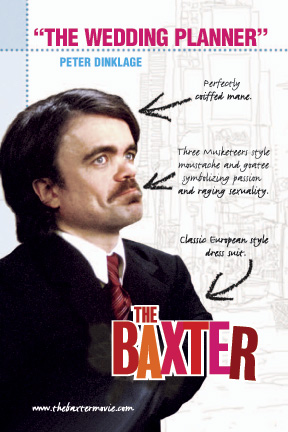 comedy mafia and he’s also in the other comedy mafia –
comedy mafia and he’s also in the other comedy mafia –
Showalter: The Will Ferrell comedy group.
Q: How does that work back and forth?
Showalter: We just both know he’s good. It’s basically two comedy camps and we both have a ringer in Paul Rudd. I love Paul Rudd and I want to keep working with him forever. It’s rare you get a guy who is movie star handsome with a big movie, film actor presence who is so good at doing silly, stupid, offbeat humor. And he gets it. He really gets it, too. He’s a friend. Paul’s a guy I hang out with and play pool with or whatever. It’s sort of like it’s cool that he’s part of this group because he brings something that’s needed.
Q: How did you meet him?
Showalter: He’s a friend of Zak Orth’s, who’s another company member, in quotes. He had done Romeo + Juliet with Zak Orth and then he had done 200 Cigarettes with Janeane Garofalo. Janeane and Zak were both going to do our movie, Wet Hot American Summer, and they had shown Paul Rudd some of the Stella videos we had been making. Paul loved that and wanted to get in on it, and then they showed him the script and he said he wanted to be a part of it.
Q: Was casting Haviland Morris a nod to Sixteen Candles?
Showalter: No! She’s just a great actor. A great, underused actress.
Q She was Baxtered in Sixteen Candles.
Showalter: That’s right, she’s a Baxter! That’s true. Haviland is a classic Baxter. But no, she’s just a great actress who lives in New York. Absolutely sweet, funny, charming woman.
Q: Michael Ian Black and David Wain were only in the film briefly. Does this feel more like a solo project to you?
Showalter: Yes and no. It was a solo project insomuch as for the first time I did all the work. But all of the people that I’ve worked with contributed to this movie. It was a different configuration in terms of how much work was getting done. Mike and David have very, for the small amount of time that they were onset, have big parts. I think they contribute a lot to the film. Certainly the other guys I’ve worked with before, Zak Orth and all the people you recognize from the movie who remind you of all the projects that I’ve done. And also having Criag Wedren and Teddy Shapiro doing the soundtrack. There’s a lot of continuity between the projects. This fits in the larger canon of what we’re all doing together, in terms of the sensibility and the look and the people who are doing it but it certainly is a more singular expression. No one is going to blame those guys if they don’t like the movie. I’ll take all the blame if you don’t like the movie.
Q: Are there any plans to have the soundtrack released?
Showalter: It’s out on the 23rd of August. On Milan Records. They did I <3 Huckabees. You can go to Tower Records and they’ll have it. It’s a great, sweet soundtrack.
Q: What’s the release schedule for this?
Showalter: It comes out August 26th in New York, and then the week after that in LA. Then in the weeks to follow kind of like everywhere else. It’s going to play at your small cinema in every city. On one screen. Hopefully people will be in the mood to see it. I’m hoping it will be a cold September because I think it’s the kind of movie people would like to see on a cold September night.
Q: This is so different from Wet Hot American Summer and The State – are you worried that people will come in expecting Wet Hot American Summer 2 and be unhappy with what they get?
Showalter: I’m a little bit worried about that, but not that worried about it. In fact, I’ve read a couple of people who have written online that that is what happened – ‘It wasn’t as funny as Wet Hot!’ or ‘It wasn’t as weird as Wet Hot!’ I’m not afraid to admit that I’m trying to appeal to a wider audience, and for every Wet Hot fan that’s going to feel alienated hopefully there will be more than that you can get it, and go ‘Wow, that was nice.’ 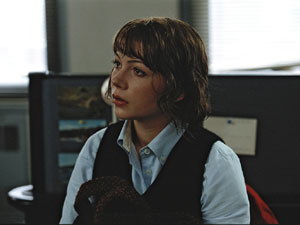 Have it be a little bit offbeat enough to make them feel like they’re not watching Must Love Dogs but still tempered and tame enough to feel that they weren’t left out. I think that Wet Hot American Summer is a movie that a lot of people feel passionate towards but is also alienating to a lot of people. I don’t want to abandon that side of me, but I am definitely trying to make a movie that is palatable to a wider audience of people.
Have it be a little bit offbeat enough to make them feel like they’re not watching Must Love Dogs but still tempered and tame enough to feel that they weren’t left out. I think that Wet Hot American Summer is a movie that a lot of people feel passionate towards but is also alienating to a lot of people. I don’t want to abandon that side of me, but I am definitely trying to make a movie that is palatable to a wider audience of people.
Q: I was surprised to see you in Signs. Is that something you want to do more of?
Showalter: No that was a one off thing. I don’t audition very often.
Q: Do you consider yourself an actor above everything else?
Showalter: I’m a writer/director guy. I consider myself in the category of whatever I do most. The acting thing – as an actor I will audition for someone like M Night Shymalan, whose work I really like. I did an episode of Sex and the City because I liked the show. Which isn’t to say that if I like something I can go be in it. But I auditioned for that movie because I like his movies. And I do two lines in an M Night Shymalan movie.
Q: And you get a laugh!
Showalter: I get the only laugh!
Q: How does the larger relationship with the whole State group work, since you’re all split up and doing different things. How often do you guys keep in touch and bounce projects back and forth? I know that you guys couldn’t be in Ken Marino’s Diggers because Stella was happening at the exact same time.
Showalter: Right. It feels like in the last year or so The State has risen from the dirt, like we’ve been underground growing bulbs and stuff and now we’re all growing out of the dirt. With Stella coming out and now The Baxter and Diggers and Michael Black is about to shoot a feature, and Tom and Ben, the Reno guys are going to make a movie soon and they have obviously been writing movies that are getting produced in Hollywood. I kind of expect more of that. I think I’ll do this again, I think David will direct a feature soon, I think Stella will come back… the answer to that is we’re only just having the opportunity to not be in each others’ stuff.
There’s sort of an LA and a New York operation. For a bunch of guys who fought a lot we’re in constant contact, really supportive of each other, really rooting for each other, and kind of on call to do whatever the others want the others to do. Certainly if Ken wanted us to do his movie we would have run to be there. I’m a little disappointed to not do it.
Q: Thomas Lennon said that Reno 911 was just one of many pilots that they did, but that one happened to stick. I’m sure you’ve done a bunch of pilots as well. Also, I see Joe Lo Truglio popping up in a lot of stuff as well, but I don’t see his name attached to writing credits.
Showalter: He is more acting than writing. Me, Mike and David and Tom and Ben were the more heavily writing group – and now Ken. I’ve been actually pretty consistently working on one project to the next. I have less coals on the fire, I more start something and finish it. It can take a while for that to happen. I have done a few pilots, but I’m mostly in New York. I was working on The Baxter for two years and then went right into Stella. Before that I was doing Wet Hot American Summer. I have had some screenwriting jobs – when I’m not doing the Stella/Baxter stuff I’m usually writing.
Q: I know Tom and Ben were big rewriters until they did enough work to get their names on screen.
Showalter: I’m at the beginning of that world. I’m sort of starting out, I’m only just starting to get hired for that. I was more trying to be an actor until my late 20s, early 30s until I decided to switch to writing and directing, which is why I wrote The Baxter. My initial impetus was that I just wanted a writing sample, I wanted to be able to walk into a room and say, ‘Here’s a sample of my ability to write a screenplay.’ It turned out really well.
Q: You mentioned there’s the LA contingent. Do you ever feel like you need to move out there?
Showalter: I like New York, I like being in New York. There are major limitations in being here, financial limitations and in terms of the work that’s available. Certainly if I wanted to be more available to do things like studio work I would need to spend more time in LA. But 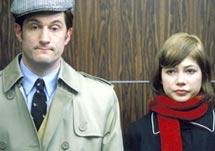 New York keeps me in a different mindset.
New York keeps me in a different mindset.
Q: When people recognize you do they throw a certain line at you?
Showalter: Sometimes. Mostly it’s just, ‘Hey you’re funny!’
Q: They don’t say, ‘I’m Doug-‘
Showalter: ‘-And I’m outta here.’ I get that every once in a while.
Q: When you were in The State did you guys have similar divisions of labor?
Showalter: No. The different writing partnerships were always morphing. As they are now. There were no strong camps, per se.
Q: I thought this was a really good film. Is there another movie in your future? What’s next?
Showalter: I’m going to take some time off but I am also going to write another screenplay. Past that I haven’t thought of much. I might start performing alone on the road. Stella had a great time touring, and just in two to three years we have grown from playing Mercury Lounge type places to playing the more Irving Plaza type places. I might go out there and play the more Mercury Lounge type places. I do love performing and I do love being out on the road. I might put together a one hour, one man Evening With Michael Showalter kind of thing to do intermittently between writing a script. But I don’t see myself running out to LA to set up anything.